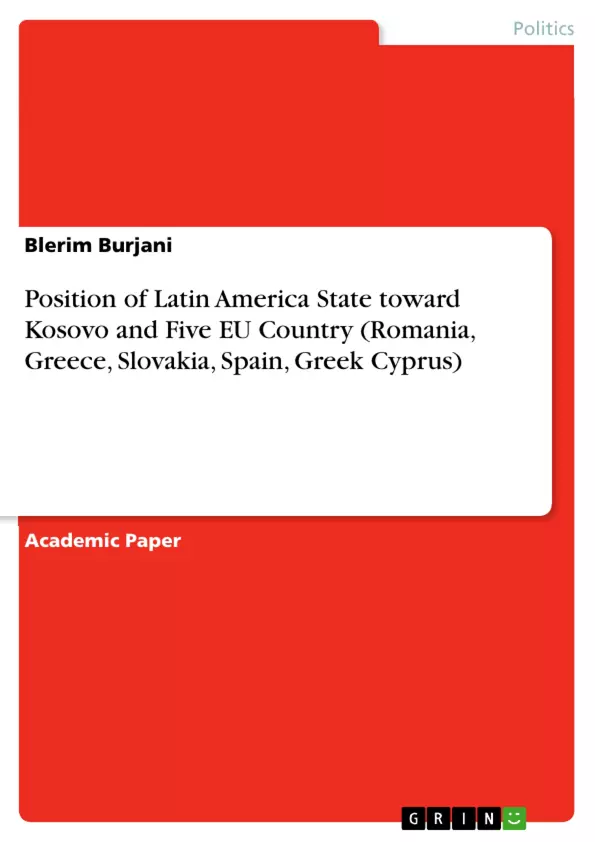Kosovo is a unique case in international law and cannot be compared to any other country, Kosovo is not an international precedent but a strong reason in international law that genocide does not happen the destruction of people's lives and their future, and the right to live freely is a dream of the democratic world and a modern contemporary reality. No one has the right to violate the humanitarian law on which today's democratic society is built. Kosovo independence is argued in the decision of the International Court of Justice, Resolution 1244 and no longer has a real impact on Kosovo as such is in transition and must change.
Table of Contents
- Abstract
- Key words:
- Position of Latin America State toward Kosovo and Five EU Country (Romania, Greece, Slovakia, Spain, Greek Cyprus)
- Recognition of Kosovo's independence by the five unrecognized EU states and Latin American states.
Objectives and Key Themes
This document examines the position of Latin American states towards Kosovo's independence, focusing on the reasons behind their recognition or non-recognition of Kosovo as a sovereign state. The paper investigates the political, economic, and historical factors that influenced the stances of individual Latin American countries towards Kosovo.
- The legal and political context of Kosovo's independence
- The role of international law and international relations in shaping the response to Kosovo's independence
- The impact of US foreign policy on the recognition of Kosovo
- The influence of domestic political factors on the positions of Latin American states
- The relationship between Kosovo's independence and the recognition of other contested states, such as Palestine.
Chapter Summaries
- Abstract: This section presents the main arguments of the paper, emphasizing the uniqueness of Kosovo's case in international law and the importance of upholding human rights and the right to self-determination.
- Position of Latin America State toward Kosovo and Five EU Country (Romania, Greece, Slovakia, Spain, Greek Cyprus): This section delves into the legal arguments surrounding Kosovo's independence, examining the decision of the International Court of Justice and the role of UN Security Council Resolution 1244. It explores the concept of self-determination and the distinct nature of Kosovo's case compared to other states that have declared independence.
- Recognition of Kosovo's independence by the five unrecognized EU states and Latin American states.: This section analyzes the reasons behind the recognition of Kosovo's independence by various countries, including the role of US foreign policy, economic interests, and political alliances. It discusses the positions of specific countries such as Costa Rica, Peru, Colombia, and Panama, highlighting their motivations for recognizing Kosovo.
Keywords
The primary focus of this work is on the position of Latin American states towards Kosovo's independence. Key terms and concepts include: international law, self-determination, Kosovo's independence, recognition of states, US foreign policy, economic interests, political alliances, and the role of international organizations such as the United Nations and the International Court of Justice.
- Quote paper
- Mr Blerim Burjani (Author), 2022, Position of Latin America State toward Kosovo and Five EU Country (Romania, Greece, Slovakia, Spain, Greek Cyprus), Munich, GRIN Verlag, https://www.grin.com/document/1165479



